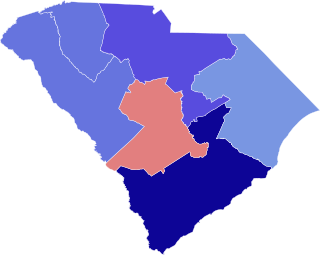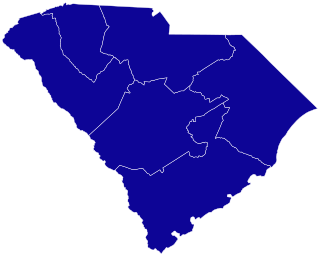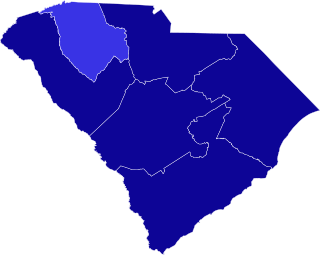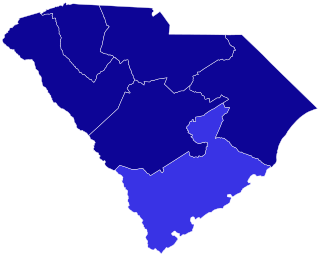
The 1968 United States House of Representatives elections in South Carolina were held on November 5, 1968, to select six Representatives for two-year terms from the state of South Carolina. The primary elections were held on June 11 and the runoff elections were held two weeks later on June 25. All five incumbents who ran were re-elected and the open seat in the 5th district was retained by the Democrats. The composition of the state delegation remained five Democrats and one Republican.

The 1954 United States House of Representatives elections in South Carolina were held on November 2, 1954 to select six Representatives for two-year terms from the state of South Carolina. The primary elections were held on July 13. All six incumbents were re-elected and the composition of the state delegation remained solely Democratic.

The 1956 United States House of Representatives elections in South Carolina were held on November 6, 1956, to select six Representatives for two-year terms from the state of South Carolina. All five incumbents who ran were re-elected and the open seat in the 5th congressional district was retained by the Democrats. The composition of the state delegation thus remained solely Democratic.

The 1972 United States House of Representatives elections in South Carolina were held on November 7, 1972 to select six Representatives for two-year terms from the state of South Carolina. The primary elections were held on August 29 and the runoff elections were held two weeks later on September 12. Five incumbents were re-elected and the only change was in the 6th district where Republican Edward Lunn Young succeeded Democrat John L. McMillan, who was defeated in the Democratic primary. The composition of the state delegation after the elections was four Democrats and two Republicans.

The 1940 United States House of Representatives elections in South Carolina were held on November 5, 1940 to select six Representatives for two-year terms from the state of South Carolina. All five incumbents who ran were re-elected and the open seat in the 1st congressional district was retained by the Democrats. The composition of the state delegation thus remained solely Democratic.

The 1942 United States House of Representatives elections in South Carolina were held on November 3, 1942 to select six Representatives for two-year terms from the state of South Carolina. All six incumbents were re-elected and the composition of the state delegation remained solely Democratic.

The 1944 United States House of Representatives elections in South Carolina were held on November 7, 1944, to select six Representatives for two-year terms from the state of South Carolina. All five incumbents who ran were re-elected and the open seat in the 2nd congressional district was retained by the Democrats. The composition of the state delegation thus remained solely Democratic.

The 1946 United States House of Representatives elections in South Carolina were held on November 5, 1946 to select six Representatives for two-year terms from the state of South Carolina. Five incumbents were re-elected, but Butler B. Hare of the 3rd congressional district was defeated in the Democratic primary by W.J. Bryan Dorn. The seat remained with the Democrats and the composition of the state delegation remained solely Democratic.

The 1948 United States House of Representatives elections in South Carolina were held on November 2, 1948 to select six Representatives for two-year terms from the state of South Carolina. Four incumbents were re-elected, but John J. Riley of the 2nd congressional district was defeated in the Democratic primary by Hugo S. Sims, Jr. The seat remained with the Democrats along with the open seat in the 3rd congressional district and the composition of the state delegation remained solely Democratic.

The 1950 United States House of Representatives elections in South Carolina were held on November 7, 1950 to select six Representatives for two-year terms from the state of South Carolina. Four incumbents were re-elected, but Hugo S. Sims, Jr. of the 2nd congressional district and James Butler Hare of the 3rd congressional district were defeated in the Democratic primaries. The seats were retained by the Democrats and the composition of the state delegation remained solely Democratic.

The 1952 United States House of Representatives elections in South Carolina were held on November 4, 1952 to select six Representatives for two-year terms from the state of South Carolina. All six incumbents were re-elected and the composition of the state delegation remained solely Democratic.

The 1934 United States House of Representatives elections in South Carolina were held on November 6, 1934 to select six Representatives for two-year terms from the state of South Carolina. All six incumbents were re-elected and the composition of the state delegation remained solely Democratic.

The 1936 United States House of Representatives elections in South Carolina were held on November 2, 1936, to select six Representatives for two-year terms from the state of South Carolina. All five incumbents who ran were re-elected and the open seat in the 4th congressional district was retained by the Democrats. The composition of the state delegation thus remained solely Democratic.

The 1922 United States House of Representatives elections in South Carolina were held on November 7, 1922, to select seven Representatives for two-year terms from the state of South Carolina. Six incumbents were re-elected and the open seat in the 6th congressional district was retained by the Democrats. The composition of the state delegation thus remained solely Democratic.

The 1926 United States House of Representatives elections in South Carolina were held on November 2, 1926 to select seven Representatives for two-year terms from the state of South Carolina. All seven incumbents were re-elected and the composition of the state delegation remained solely Democratic.

The 1928 United States House of Representatives elections in South Carolina were held on November 6, 1928 to select seven Representatives for two-year terms from the state of South Carolina. All seven incumbents were re-elected and the composition of the state delegation remained solely Democratic.

The 1930 United States House of Representatives elections in South Carolina were held on November 4, 1930 to select seven Representatives for two-year terms from the state of South Carolina. All seven incumbents were re-elected and the composition of the state delegation remained solely Democratic.

The 1932 United States House of Representatives elections in South Carolina were held on November 8, 1932, to select six representatives for two-year terms from the state of South Carolina. The state lost a seat from redistricting that occurred from the 1930 census. Four incumbents were re-elected and the two open seats were retained by the Democrats. The composition of the state delegation thus remained solely Democratic.

The 1896 United States House of Representatives elections in South Carolina were held on November 3, 1896, to select seven Representatives for two-year terms from the state of South Carolina. Five Democratic incumbents were re-elected, one Republican incumbent was defeated, and the open seat was retained by the Democrats. The composition of the state delegation after the election was solely Democratic.

The 1924 United States House of Representatives elections in South Carolina were held on November 4, 1924, to select seven Representatives for two-year terms from the state of South Carolina. Five incumbents were re-elected and the two open seats were retained by the Democrats. The composition of the state delegation thus remained solely Democratic.







